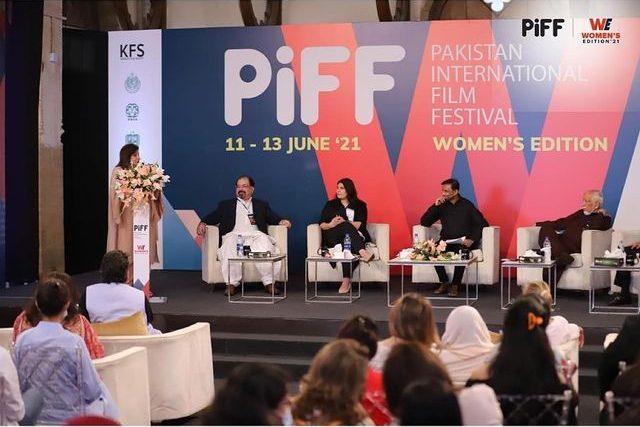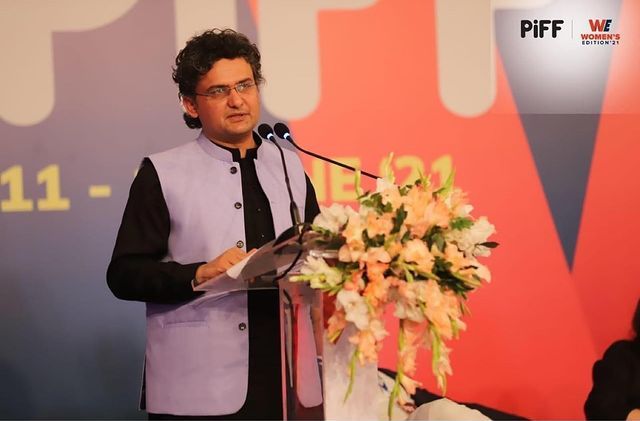President HUM network, Sultana Siddiqui, under the umbrella of Karachi Film Society (KFS) and its esteemed board members, recently organized the third Pakistani International Film Festival – Women’s Edition (PIFF). With an aim to celebrate local cinema, our artists, as well as have close interaction with all stakeholders involved in the process of film making, the festival organized seminars and workshops to discuss with who’s who of the fraternity about the much-needed change for the development of Pakistan’s film industry.
Despite many challenges due to COVID-19 pandemic, the three-day film festival was held under strict SOPs at the Frere Hall in Karachi from 11th to 13 June. However, to make it a bigger success and control the live audience count, all seminars were streamed online for registered users to enjoy the sessions.
The festival kicked off with a session on the lack of growth of Pakistani films internationally, head by film critic Mohammed Kamran Jawaid. Although the Women’s Edition had a dearth of women panelists, it was addressed at the beginning that few of them, including producer Ammara Hikmat, weren’t able to make it to the session due to the pandemic. The esteemed members include Chairman of IMGC Group Amjad Rasheed, Chief Executive at Lotus PR and Project Lead Advisor, Brand Pakistan Selina Rashid, Senior Vice President ARY Films Irfan Malik and film producer Omer Paracha.

PIFF Day 1: Irfan Malik, Selina Rashid, Kamran Jawaid, Amjad Rasheed
During the discussion, many problems faced by filmmakers and producers came into light and it was a consensus that majority of the problems stem from low return of investment, aesthetics of the films produced, lack of government facilitation, the need to experiment with various genres and upgrade in filmmaking technology and equipment.
Amjad Rasheed pointed out that Pakistan is not willing to create an international market despite of having an asset of overseas Pakistanis. “Commerce ministry isn’t willing to give incentive to film industry. We aren’t willing to capitalize on our asset. I have been going to Cannes for the last seven years (minus the last year) and every country has a presence there except Pakistan,” he said.
Irfan Malik emphasized that “the mother of all reasons would be the size of the market and the financial limitations and the impact of these limitations to our filmmaking.”
Selina rightfully pointed out that we have never viewed Pakistani film from “a marketing and branding lens. We are not proactive at branding our industry. We promote each of us as individual entities. We have to position the industry first.”
However, being an international film producer, Omar views it from a different perspective. “There is a big language barrier and we have to work on the quality of our movies. I don’t think we meet the international standards especially for these big streaming platforms,” he expressed.
Talking about the OTT platforms, Amjad Rasheed stated that “Our approach towards film is very limited; we have rom-coms and dramas only. I believe the future is OTT platforms and we have to develop it and make content for it.” However, he also pointed out how TV channels have spoiled the actors and now they quote huge sums for digital content as well. “We’ve to create new talent and stop comparing the budgets to realistically counter-economic and potential of the industry. OTT content should not be as expensive as films.”
This “cinema vs. OTT” debate is quite a burning question, especially after the pandemic but Irfan believes that cinema is here to stay for the next 50 years.
“We need to increase the number of “better quality” films that we make in a year to increase the export. Right now, we are stuck at 1 or 2 films a year so nobody in the international market takes us seriously. Then, you international distributors and dilute your share further. I think we need to make more commercial films that have any chance of making money globally and then focus on alternate cinema for festivals much later,” he expressed.
This led to a very pertinent discussion when Selina shared how we have a great case study in recent times in the form of Ertugurl, a Turkish drama that made a global sensation. “It was made with the support of Turkish government and this is an ideal example of leveraging film or TV shows for soft power diplomacy and commercial viability. There are even papers written on that project; and then when we look at Pakistan, we have drawn a line between what is commercial and culture. I believe they are not mutually exclusive,” she said.
Amjad Rasheed believes that the only solution he can think of is co-productions. “It divides the cost and doubles the market like China is a big market. Unfortunately, despite my best efforts, we haven’t arranged one co-production as of yet. Unless government is willing to co-operate, we cannot change our current situation. We have markets like Turkey, or even Korea now,” he said, adding that he wants to raise the issue at a proper forum; however, PM Imran Khan has not met the producers association for two years. “We make films on our own expenses; I’m hoping for at least a co- production. We have everything but not the resources to sit anywhere for a month.”
Selina responded in agreement and emphasized that we have to make our film industry a formidable force so that the PM meet the stakeholders. “No government has ever given to public diplomacy; you strengthen soft powers, grow infrastructurally in order to export,” she stated.
Irfan mentioned that “Pakistan is as close to a film policy as ever and we are desperately in need of a bailout package right now. I also think that the 117 missions abroad can also help promote our industry,” he expressed.

Senator Faisal Javed Khan
Adding more to the role government is playing in making Pakistan’s film industry a global success, Senator Faisal Javed Khan delivered a keynote speech in which he stressed that “government cannot run the industry; it can only create the environment conducive to growth.”
He said that we need to concentrate on growing locally before making plans of growing internationally. He addressed different issues faced by the industry; money being the major one. “Pakistan’s film industry needs a minimum of 1,000 screens and at least 100 films a year just to sustain it. We have hardly 150 screens right now,” he said.
He also warned the filmmakers not to copy the neighbouring country if they wanted to go global and advised them to present their own ideas to the world. Unfortunately, upon inquiry by an attendee, there was no clear consensus on the image of Pakistan we actually want to represent. Nonetheless, it was kind of the senator to emphasize they the government cannot meddle with the creative people.
While addressing the government’s incentives and facilitation for the film industry, he said that Imran Khan has approved an entertainment, film policy that will soon be launched.
“There are incentives for all stakeholders as well as ways to encourage co-productions and promote tourism as well,” he said.
Watch the highlights of the PIFF Day 1 seminar/webinar here:





